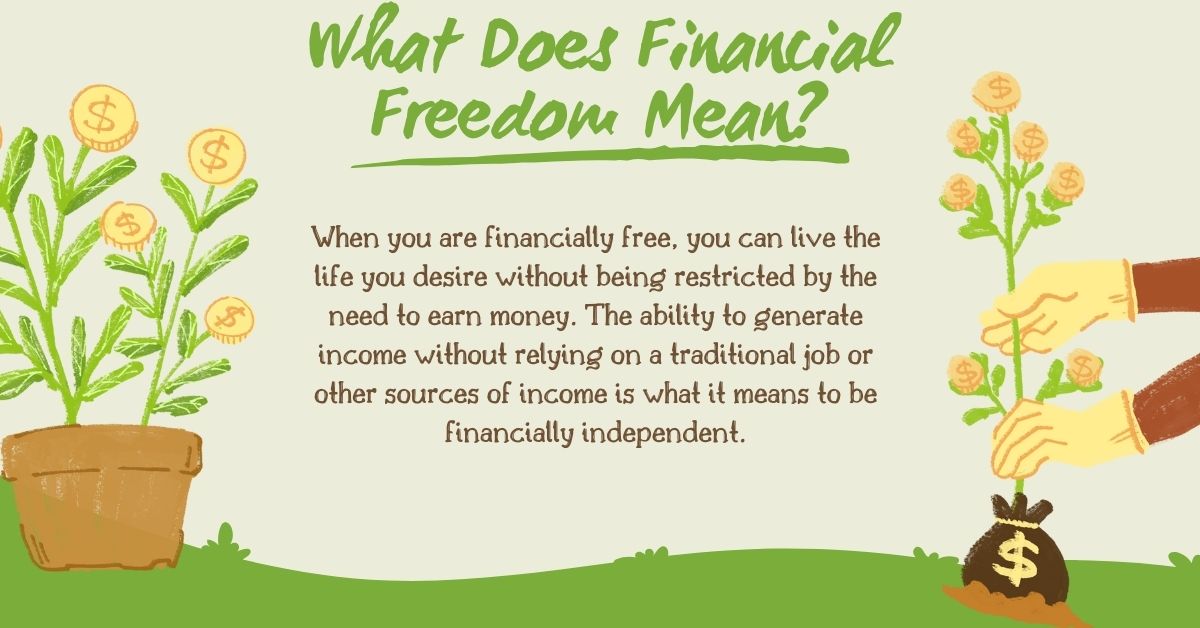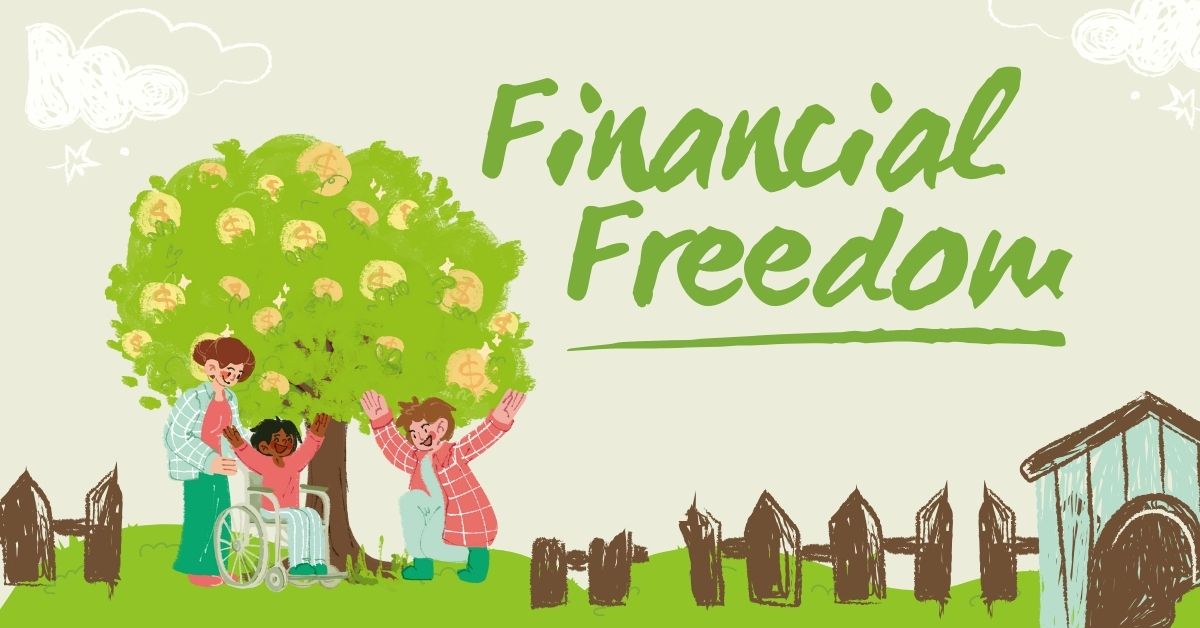Imagining a world without money stress. A place where you are free to pursue your passions without financial constraints. Having financial freedom means living your life to the fullest – a state of abundance.
What Does Financial Freedom Mean?

When you are financially free, you can live the life you desire without being restricted by the need to earn money. The ability to generate income without relying on a traditional job or other sources of income is what it means to be financially independent.
Depending on who you are, this can manifest in different ways. In some cases, this may mean retiring early and living off their investments. Some people may enjoy having the freedom to work on projects they love, travel, or spend time with family without worrying about their finances.
In the end, financial freedom comes down to being able to control your finances. Financial freedom means living life according to your terms, without the burden of financial worry.
The Cost of Financial Freedom
In many cases, financial freedom comes at a cost in terms of time, effort, and lifestyle choices. To achieve a more secure future, you need to plan carefully, save and invest disciplinedly, and potentially make sacrifices now. Investing in passive income-generating assets may be the key to delaying large purchases and reducing unnecessary expenses.
A person’s specific cost will vary depending on his or her income, expenses, investment returns, and desired lifestyle. It requires years of consistent effort and a willingness to adapt one’s spending habits to achieve this goal.
It is also possible that achieving financial freedom may involve intangible costs. A focus on financial goals can lead to stress and anxiety, the opportunity cost of foregoing immediate gratification, and missed social or personal opportunities.
How to Define Your Own Version of Financial Freedom?
A person’s definition of financial freedom is deeply personal. In order to achieve your goals, you must understand your values, dreams, and aspirations. What is truly important to you? Having financial security gives you the freedom to travel the world, start a non-profit, or simply have peace of mind.
It is important to identify your core desires before you can start quantifying them. In order to achieve these goals comfortably, how much money would you need? What kind of lifestyle do you envision? The answers to these questions will help you set realistic and meaningful financial goals.
Read more:
- Top 5 Financial Mistakes People Make in Their 20s: Are You Making These Common Money Mistakes? Find Out Now!
- Best Saving Plans for Individuals in 2025: Achieve Your Financial Goals
How to Reach Financial Freedom?
In order to achieve financial freedom, you must be dedicated, disciplined, and have a long-term perspective. In order to achieve this, you need to carefully plan, adopt smart spending habits, and save and invest consistently.
A basic step towards creating a budget is to keep track of your income and expenses. As a result, you will be able to identify areas where you can cut back and allocate funds to savings and investments. Reducing financial burdens also requires paying off high-interest debt, such as credit cards.
Having an emergency fund is essential when unexpected expenses and financial setbacks arise. Aim for a fund that covers three to six months of living expenses. You can also increase your long-term savings by contributing to retirement accounts like 401(k)s and IRAs, especially if your employer matches your contributions.
To achieve financial freedom, you need to invest your savings wisely. To do this, you must develop a diversified portfolio aligned with your financial goals and risk tolerance, which includes stocks, bonds, and real estate.
Last but not least, it is crucial to adapt to changing financial conditions and to learn continuously. To achieve your financial freedom goals, you should regularly review your budget, modify your investment strategy, and seek professional advice as needed.
How to Achieve Financial Freedom Before 30?
The goal of achieving financial freedom by 30 is a challenging one, but one that can be achieved. To achieve it, one must be disciplined and have a long-term perspective. Taking advantage of compound interest is one of the key strategies. You should start investing as soon as possible, even if it is just a small amount, and allow your investments to grow over time.
Living below your means is another crucial aspect. This involves creating a budget, tracking your expenses, and finding ways to save money. Spending unnecessary money should be avoided and needs should be prioritized over wants. As well as minimizing debt, especially high-interest debt like credit cards, investing and saving can be made easier by eliminating debt.
You can also achieve financial freedom by increasing your income. In order to accomplish this, promotions, salary negotiation, or side hustles and entrepreneurial ventures can be pursued. Aside from investing in yourself, it’s also important to acquire new skills and knowledge that will increase your earning potential.
Finally, you should stay informed about personal finance and investment strategies. It involves reading books, attending workshops, or consulting with financial professionals. Make informed decisions by continually learning and adapting to the ever-changing financial landscape.
Getting financial freedom before 30 is not a sprint, it’s a marathon. It requires consistent effort, discipline, and a long-term perspective. By starting early, living below your means, increasing your income, and investing wisely, you can significantly increase your chances of achieving your financial goals.
Benefits of Financial Freedom
Financial freedom provides numerous benefits that go far beyond the collection of wealth. It gives people more control over their lives, less stress, and the freedom to follow their interests and aspirations.
One of the main benefits of financial independence is the opportunity to make decisions based on personal values and goals rather than financial restrictions. This independence enables people to pursue occupations they are excited about, start their own enterprises, or devote time to volunteer or community service. It also gives you the freedom to travel, spend time with loved ones, and pursue hobbies and interests without worrying about the financial consequences.
Financial freedom also leads to a large reduction in stress and anxiety. The continual anxiety about bills, debt, and financial insecurity can have a negative impact on mental and emotional health. Individuals who achieve financial freedom can alleviate these fears and experience greater peace of mind. This can result in better overall health, more happiness, and stronger relationships.
Also, financial freedom serves as a safety net for unexpected life situations. It enables people to withstand financial storms such as job loss, medical emergencies, or economic downturns without incurring significant financial hardship. This security gives people more peace of mind and allows them to focus on their own and their loved ones’ well-being.
How to Be Financially Independent Without a Job?
It is a challenging but achievable goal to become financially independent without a job. In order to support your lifestyle, you need to build multiple streams of passive income. The following strategies can help:
- Investing: Invest in income-producing assets like stocks, bonds, real estate, or businesses that pay dividends. This calls for thorough investigation and knowledge of investment concepts.
- Real Estate: Think about investing in real estate investment trusts (REITs), flipping homes, or renting out properties. Capital gains or steady rental income may result from this.
- Online Businesses: Launch an online business by developing and selling online courses, dropshipping, affiliate marketing, or e-commerce. This calls for a strong web presence and entrepreneurial abilities.
- Content Creation: Gain followers on social media sites like Instagram, TikTok, and YouTube. Use sponsorships, advertising, or product sales to make money off of your material.
- Investing in Yourself: Learn new things that will help you make money. This could entail becoming a licensed financial advisor, learning a new language, or honing your coding abilities.
- Strategic Savings: Make wise investments and set aside a sizeable amount of your salary for savings. Discipline and a long-term outlook are necessary for this.
To become financially independent without a job, you must plan carefully, put in consistent effort, and be willing to take calculated risks.
If you want to read about 10 passive income ideas, you can read here: 10 Passive Income Ideas for Financial Freedom (2025)

